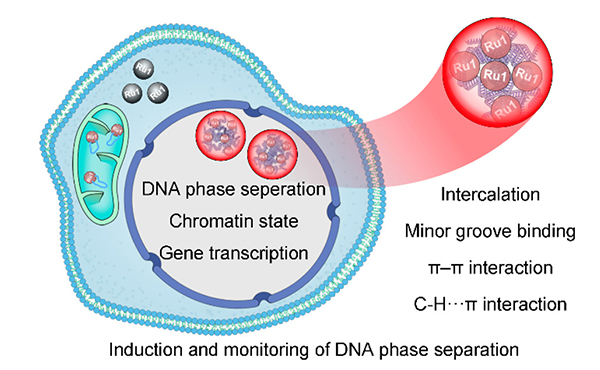The phenomenon of "liquid-liquid" phase separation (LLPS) of biological macromolecules in living cells regulates many cell activities.
DNA LLPS manipulates many important processes such as gene transcription, translation, and chromosome high-level structure assembly. Abnormal of DNA LLPS causes oncogene expression, genome inactivation, uncontrolled transcription activation and other cellular processes, which are directly related to fatal diseases.
Recently, a research group led by Prof. LI Guohui from the Dalian Institute of Chemical Physics (DICP) of the Chinese Academy of Sciences (CAS), in collaboration with Prof. MAO Zongwan's group from Sun Yat-Sen University, revealed the molecular mechanism of ruthenium complex induced DNA phase separation in living cells.
This study was published in Journal of the American Chemical Society on July 22.

Illustration of the mechanisms of DNA phase separation induced by ruthenium complex (Image by ZHANG Yuebin and LI Guohui)
Prof.Mao' group proposed a metal ruthenium complex with high DNA affinity and photo-switching properties to fulfill the real-time detecting and monitoring of DNA phase separation process in living cells. In addition, the metal ruthenium complexes also exhibited potent anticancer activity both in Vitro and in Vivo conditions.
Prof LI’s group utilized multi-scale molecular dynamics simulations to unveil the underlying mechanism of ruthenium complex induced DNA phase separation, where the positively charged lipophilic triphenylphosphine substituents and the flexible long alkyl chains of the ruthenium complex provided significant contributions in inducing DNA assembly.
This study provides new ideas for the design of interventional reagents for inducing DNA phase separation of living cells.
The research was supported by the National Natural Science Foundation of China. (Text by ZHANG Yuebin and LI Guohui)